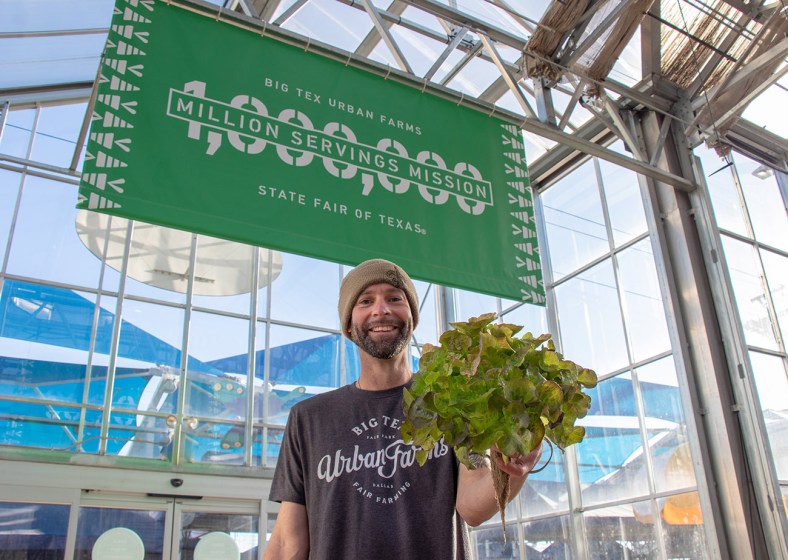Drew Demler, the State Fair of Texas director of horticulture and cofounder of Big Tex Urban Farms, and his staff were able to achieve the farm’s Million Servings Mission ahead of schedule using a variety of controlled environment hydroponic production systems. Photos by Jessie Wood, State Fair of Texas
Big Tex Urban Farms announced in July that using its controlled environment production systems it had grown enough vegetables to deliver a million servings to the local Dallas community.
When Jason Hayes, vice president of branding and cofounder of Big Tex Urban Farms in Dallas, came up with the Million Servings Mission project in 2018, there was some question as to when the non-profit operation might achieve this lofty goal. Big Tex Urban Farms got its start in 2016 as an outdoor gardening project by the State Fair of Texas to better serve the local South Dallas community.
“Big Tex Urban Farms started with a small budget in 2016 using 100 mobile planter boxes to grow food outdoors,” said Drew Demler, who is the state fair’s director of horticulture and the other cofounder of the farm. “At the time Jason and I started planning the farm, the goal was to grow produce and then donate it to the community.”
During that first year of outdoor production the farm produced food that was donated to two local charitable organizations. Growing and donating fresh vegetables gave Demler and his staff an opportunity to develop good relationships with the organizations they were assisting.
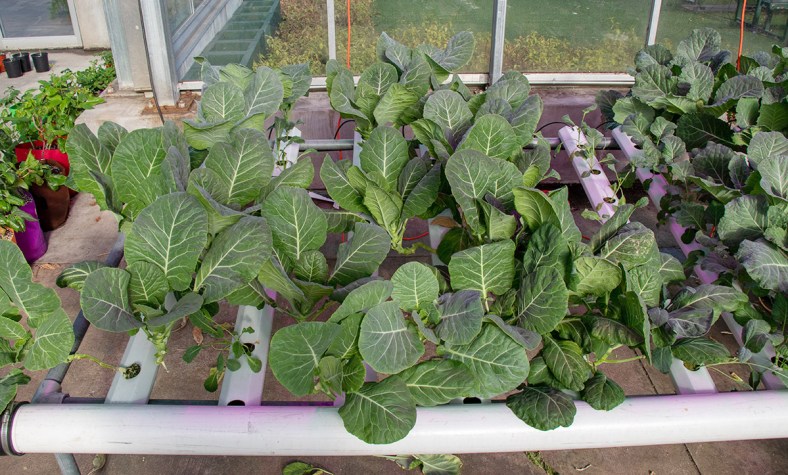
“These local organizations were very happy with what we were doing to assist them in their efforts to feed people in the community that really needed help,” he said. “We also received some good media coverage which helped generate more interest in what the farm was doing.”
The positive feedback from organizations that benefitted from the fresh vegetables and favorable media coverage led to a major increase in the farm’s budget in 2017. The budget increase enabled Demler and his staff to build an additional 429 outdoor planters. An even bigger opportunity to grow more fresh vegetables came in September 2017 when a 30- by 15-foot hydroponic deep water culture pond was installed in the fair’s largest 7,200-square-foot greenhouse. The greenhouse had been used to grow ornamental plants including palm trees and bougainvillea, and to overwinter hanging baskets. It was also used as a plant exhibit room during the state fair.
“We worked with the staff at Hort Americas to design and install the deep water culture system,” Demler said. “We also installed six 8-foot tall vertical tower gardens. This was our first venture into hydroponic growing.”
Expanding controlled environment production
Demler and his staff were impressed with the amount of produce they were able to grow with the hydroponic production systems. In the short amount of time that the systems had been installed and production was ramped up enabled the farm to distribute fresh vegetables to more community organizations in South Dallas.
“Our total production indoors and outdoors in 2017 was around 2,800 pounds of produce,” Demler said. “By the end of April 2018 we had exceeded what we produced for all of 2017. This was one of the main reasons that we decided to expand our hydroponic systems. It is such a better and more efficient way to grow.
“Another reason we expanded the hydroponic systems was the overwhelming positive response from the public during the 2017 fair. In 2018 we turned the greenhouse into an indoor growing exhibit. The public had access to the hydroponic systems all 24 days of the fair.”
Focused on hydroponic production
With the help of Hort Americas, Demler and his staff began to expand the farm’s hydroponic production.
“In 2018 we added a second deep water culture pond, a nutrient film technique (NFT) system, a Dutch bucket system for vine crops and additional grow racks,” Demler said. “We continue to add systems and do modifications to them.
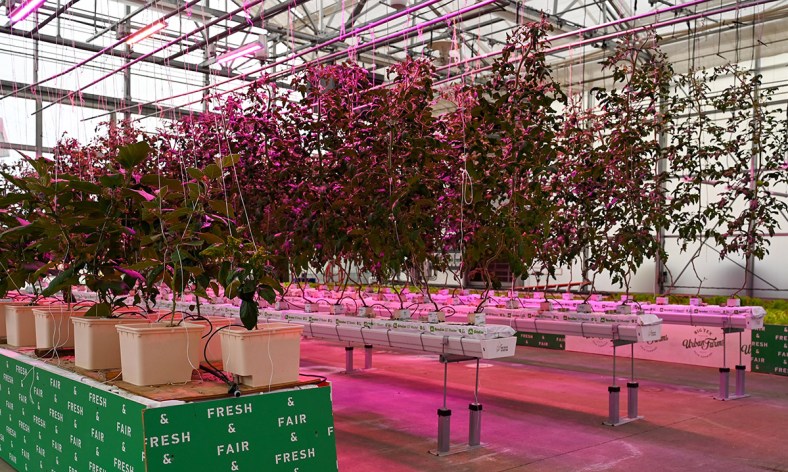
“Our main greenhouse, which is part of the Innovations in Agriculture exhibit during the state fair, has been repurposed 100 percent for food production. We have nearly completely filled the greenhouse with different hydroponic systems. We also have added a gutter slab system for vine crops which we are currently using to grow tomatoes. A second larger NFT system will enable us to produce five times more plants than the original NFT system. ”
In addition to the 7,200-square-foot greenhouse the farm has installed a 40-foot shipping container that was nicknamed GroZilla.
“Hort Americas staff designed the shipping container production system,” Demler said. “Currently we use it primarily for demonstration and as an introduction to controlled environment horticulture. We have grown a variety of crops in the container. All of the produce feeds into the different local community groups including providing lettuce blends for schools. We have also grown Asian greens, baby kale and arugula in the shipping container in collaboration with another community action group called Restorative Farms. With what we are doing hydroponically, we have nearly eliminated any soil-based production here on site.”
Much of the equipment that has been installed in the Big Tex Urban Farms greenhouse was previously used in Hort Americas’ demonstration and research greenhouse in Dallas.
“Hort Americas has changed its focus from having its own demonstration greenhouse to putting our energy and resources behind making Big Tex Urban Farms successful,” said Chris Higgins, president at Hort Americas. “Hort Americas is providing human resources and grower knowledge along with access to innovative technology. The biggest thing that we are doing is teaching the Big Tex Urban Farms employees how to grow hydroponically.”
Big Tex Urban Farms is currently using LED grow lights on a variety of its crops.
“We have a few different versions of Current’s Arize LEDs along with a few OSRAM LED lamps,” Demler said. “We recently installed the new Current L1000 LED fixtures over our vine crop systems. Those will increase growth and we already have tomatoes setting fruit.”
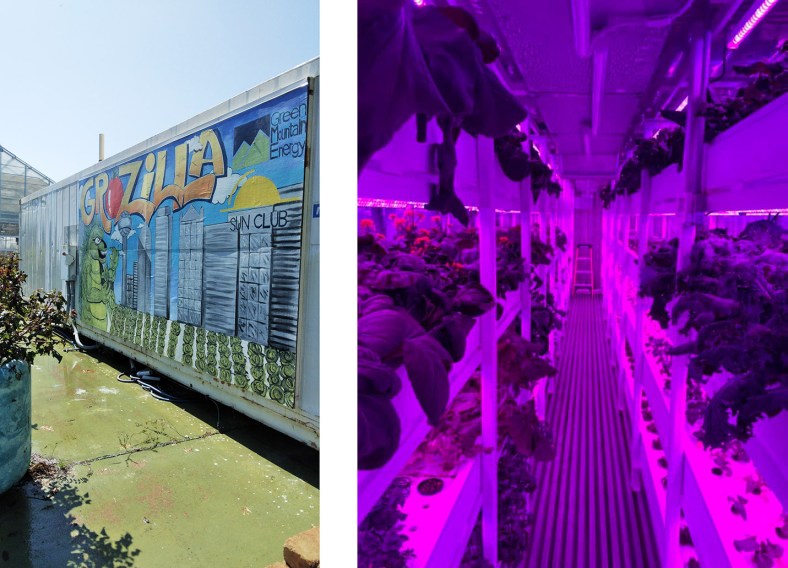
Overcoming major obstacles
Demler said although the farm reached its goal of producing a million servings of fresh vegetables earlier than expected, there were several obstacles to overcome to achieve the goal. “The COVID-19 pandemic and February 2021 power outages that affected many parts of the state had a major impact on what the farm was able to produce,” Demler said. “We were not able to host a state fair in 2020 because of the pandemic. The state fair did a modified drive-thru event, which impacted the farm’s budget. It took having us to get through a full state fair in 2021 to get our budget reinstated. Our farm is funded 100 percent by the state fair. A portion of the proceeds of whatever our guests and patrons spend at the fair helps to fund projects like our farm.
Another major obstacle the farm had to overcome was the power outages that occurred during the winter in 2021.
“There were multiple electrical outages that occurred in February that killed many of our crops,” Demler said. “Surprisingly our deep water ponds by-and-large made it through those outages.”
Another thing that helped the farm reach its million servings goal earlier than expected was the cooperative project it began with Texas A&M AgriLife to produce outdoor crops at one of the extension service’s satellite locations.
“We donated several of our raised planter beds and then the extension service received funding to install additional planter beds,” Demler said. “There is about 1 acre of outdoor raised bed production at this location.
“We were able to harvest a large outdoor tomato crop this summer. In addition to tomatoes, we will also be producing a number of root crops including potatoes, onions, carrots, turnips, sweet potatoes and other crops that soil is just more efficient for growing compared to hydroponic production. Those outdoor crops are going to feed into our program as well.”
Push for education
Now that Big Tex Urban Farms has reached its million servings goal Demler is looking to make a bigger push for education.
“We are looking to educate both people who would come to the greenhouse to learn about the farm’s production systems and the farm reaching out to local schools,” he said. “We want to be able to teach more children about growing their own food. Some of the churches and community groups coming through the greenhouse are interested in learning more about the production systems. Some of these groups are interested in putting some of these systems into schools.
“Most of the school groups we are working with want to do something with a vertical hydroponic system such as grow racks or tower gardens. Space is limited in the classrooms so they are looking at some type of vertical system. In a lot of cases they are going to locate the system near sunny windows and probably add some LED lighting to supplement the natural light.”
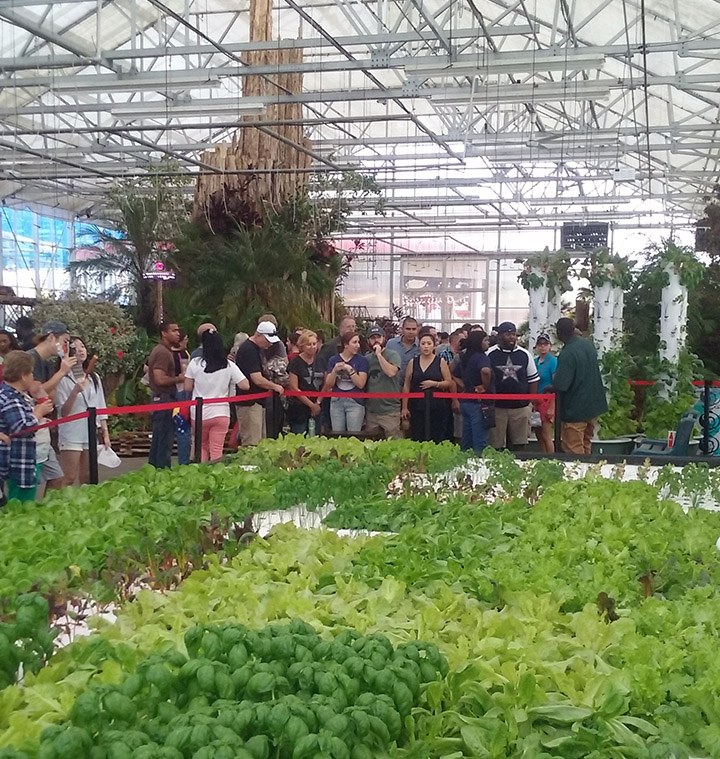
For more: Big Tex Urban Farms, (214) 565-9931; info@BigTex.com; https://bigtex.com/urbanfarm.
Editor’s note: This year’s State Fair of Texas is scheduled for Sept. 30-Oct. 23 in Dallas, https://bigtex.com/.
This article is property of Urban Ag News and was written by David Kuack, a freelance technical writer in Fort Worth, Texas.


